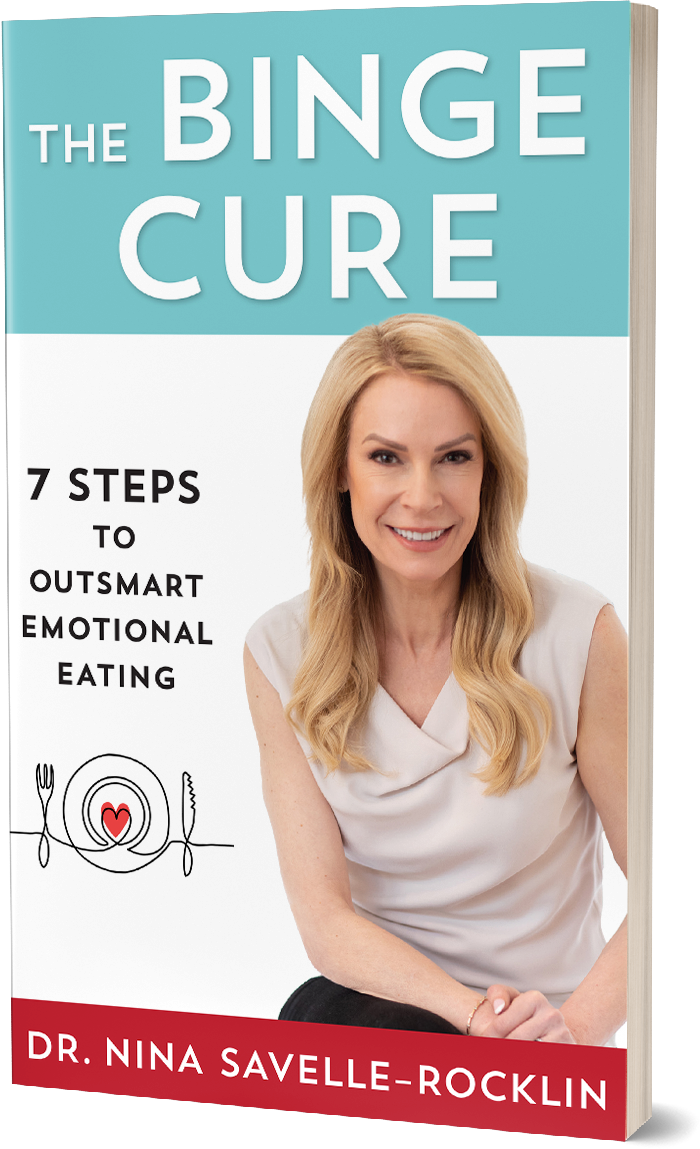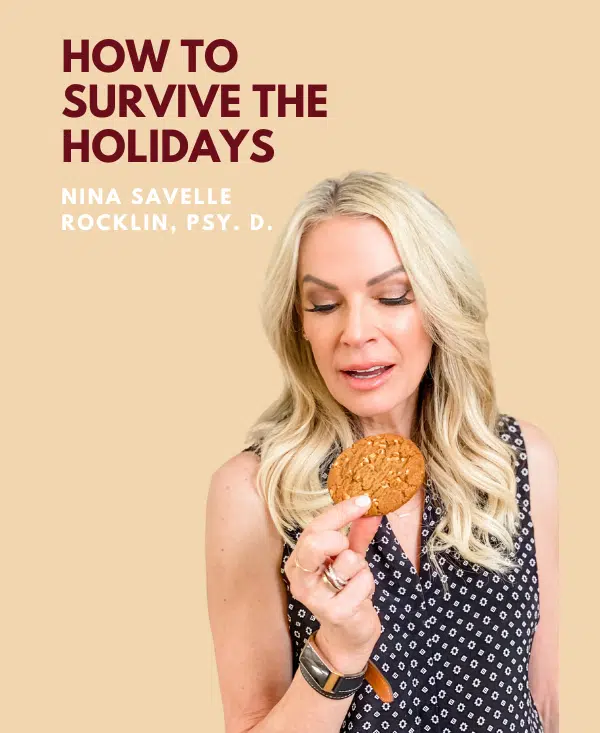Dr. Nina Savelle-Rocklin
8 Inspiring Resolutions to Transform Your Relationship with Food and Body in 2024

Table of Contents
- 1. Understand Hidden Motivations
- 2. Turn Your Critic Into a Friend
- 2. Make Friends with the Mirror
- 5. Reflect on Family & Cultural Messaging
- 6. Declare a Truce with Numbers
- 7. Celebrate Body Diversity
- 8. Find Joy in Movement
- Developing a Positive Relationship with Food and Your Body
- Frequently Asked Questions
As we ring in a new year, so many of us feel motivated to finally get in shape, lose those last 10 or 20 pounds (or more), positively transform your relationship with food, stop binge eating, and kick the sugar habit once and for all. Making goals around eating better and getting active come from the wish to feel healthier and happier. So, what could be wrong with that?
Well, nothing is inherently wrong, but here’s the reality: Despite our best efforts, by mid February most ambitious diet and exercise resolutions have gone totally off the rails, leaving us feeling defeated and demoralized.
New Year’s resolutions usually fail for several reasons. One common reason is that we set unrealistic goals, making behavior based resolutions to lose weight, exercise more, stop smoking, stop binge eating, pay off debt, travel more, and so forth. Many of us also try making drastic changes overnight, which can be challenging to sustain in the long run.
What if, this year, you tried a different tactic? Instead of focusing on changing behavior such as vowing to stop binge eating, set an intention that involves personal growth, connection, and passion. Connecting to our deeper selves also helps us cultivate a sense of self-compassion and self-acceptance.
Instead of the usual “lose weight, hit the gym” resolutions, let’s get radical and vow to change our relationship with food, bodies and ourselves? Here are some suggestions on how to ring 2024 on a more realistic and positive note.
1. Understand Hidden Motivations
Get curious instead of beating yourself up for what you eat or weigh.
Delve into how you might be using food to cope with or distract from emotions. Is heading for the pantry a way of masking feelings like sadness, anger, or other emotions that you require attention? Tune into your emotions and relationships during times of emotional eating, numbing out, or deprivation to uncover any underlying connections.
One unique approach to understanding and addressing binge eating patterns is to use the Food-Mood Formula that I developed in my first decade as an eating disorder clinician. This formula is based on the understanding that our relationship with food is often a reflection of our emotional state. The foods we crave can tell us a lot about our underlying feelings and emotions.
In working with countless people struggling with eating and food issues over the years, I noticed some clear patterns around cravings. Despite differences in age, background or gender, desired foods tend to fall into three main categories:
- Smooth, creamy foods like milkshakes, pudding or ice cream.
- Filling, starchy foods like pasta, pizza, muffins or french fries.
- Crunchy, salty foods like pretzels, chips or nuts.
Through deeper exploration with clients in my practice and courses, it became clear these cravings point to underlying emotional needs. When someone feels drawn to smooth, creamy food, it often signals a need for nurturing. If they seek out filling, bigger portions, it indicates a wish to fill a void and cope with loneliness or emptiness. And craving crunchy, biting snacks relates to suppressed forms of anger such as frustration, irritation, annoyance, or rage.
Of course, ice cream itself doesn’t provide lasting comfort. The key is learning new self-soothing skills to meet the need for care and calm when upset. Much like you’d listen and support a friend, instead of handing them sweets because they feel sad or stressed.
In the same vein, continually eating more pizza or pasta leaves you emotionally hungry if social connections or a sense of purpose require attention. And endlessly crunching through bags of chips won’t resolve anger issues needing to be addressed.
Some people crave all three categories in a sitting – maybe vanilla ice cream with nuts, which is a sign of needing comfort and also being upset. Exploring the predominant emotions and needs driving any recurring food craving is essential so you can make lasting change.
As for chocolate or candy, consider whether you need more sweetness in your life.
Next time a sudden desire for a usual trigger food pops up, consider: creamy and smooth, starchy and filling or salty and crunchy? Get curious about what feelings and inner conflicts are behind the craving. By focusing on the root emotion, need, conflict, or wish, you stop using food to cope.
2. Turn Your Critic Into a Friend
To break free from emotional eating, it’s important to banish that inner critic and instead cultivate self-compassion. Imagine treating yourself as you would a friend who is struggling. Rather than harsh criticism, respond with understanding and care.
When you feel the urge to dive into your favorite comfort food, get curious. Ask yourself, “What’s going on that’s making me crave this?” Use the Food-Mood Formula to tune into the emotions or situations triggering the desire to eat. Once you identify those root causes you can address them directly with support and reassurance.
It’s common for our inner critics to tear us down, contributing to binge eating and feeling terrible. Statements like “You’re so pathetic and weak” or “You’ll never break this habit” in the second person pronouncement of “you” come from a mean place that fuels shame. You may turn to food just to escape your own mean voice.
Imagine if your best friend was having a very hard day. Perhaps she failed an important test, had a falling out with someone, or faced a hardship that left her upset. Would you push cookies, ice cream and junk food her way as “comfort”? Of course not! You’d likely say, “I’m so sorry this happened. I know it’s really tough right now. How can I help support you?” Bring this quality of compassion to yourself in difficult moments.
Use my signature acronym VARY to validate, acknowledge, reassure and ask yourself what you need when you feel the urge to eat for comfort or distraction. For example: “It makes complete sense I feel disappointed about that setback (validate). Anyone would feel this way (acknowledge). This feeling won’t last forever, and things will get better in time (reassure). What do I most need right now to care for myself?” Then focus on meeting those needs.
The same words said harshly versus kindly make a world of difference in impact. Like giving yourself a verbal hug of understanding versus criticism. Learn to self-soothe with gentleness and warmth. You’ll find you don’t need to fill emotional voids with food.
Get honest about the harsh inner voices and impossible standards you’re holding yourself to, and practice telling those critics to quiet down. Reflect on whether the self-critical habits are something you would direct towards a loved one in a similar situation.
2. Make Friends with the Mirror
Check in on how societal standards, such as comparing yourself to photo-shopped images or internalizing societal biases about body types, impact your feelings about your body. This includes considering the influence of friends, family, and diet culture on your self-image.
Making friends with the mirror is a crucial step in overcoming binge eating and fostering a healthier relationship with your body. This strategy involves accepting and loving your body as it is, without judgment or criticism. It’s about seeing your body as a friend, not an enemy.
Start by standing in front of the mirror daily. Instead of focusing on perceived flaws, concentrate on the parts of your body you appreciate. This could be your eyes, your smile, or the strength in your arms. This practice can help shift your perspective from negative to positive.
Remember, it’s okay to have days where this is difficult. The goal is not to love your body every single day, but to cultivate a more compassionate and accepting relationship with it over time.
This doesn’t mean adopting body positivity. Many of us face a challenging paradox in our relationship with food and body image. On one hand, there’s a profound dissatisfaction with our weight, a feeling that often spirals into a deeper self-loathing. This can become a daily struggle, where just getting dressed reminds us of perceived inadequacies.
On the other hand, there’s a societal push towards body positivity and self-acceptance. This movement, while well-intentioned and necessary, can inadvertently add a layer of guilt for those who find themselves unable to embrace their bodies as they are. It’s as if there’s an added pressure not just to look a certain way, but also to feel a certain way about how we look.
It’s painful to feel bad about your body and then to feel even worse because you can’t embrace body positivity. Instead of forced body positivity, focus on understanding the emotions, beliefs, and experiences that led you to develop this relationship with the mirror.
Be gentle with yourself as you create a balance between aspiring to be your healthiest self and nurturing emotional well-being. It’s okay to want to change your body, but finding peace with your current self is equally important.
Ever get a new car and then notice that you see the same car everywhere you go? That’s because we’re more likely to see what we’re looking for, even if we’re not aware of that filter. The more you consciously focus on what you like about your appearance, the more you’ll see what you like.
The goal isn’t just to accept our bodies as they are but to accept ourselves in our entirety, with kindness and without judgment. This acceptance doesn’t happen overnight, but it’s a crucial step towards a healthier and happier relationship with food, our bodies, and, most importantly, ourselves.”
Making friends with the mirror is not about achieving a certain look or size, but about fostering a healthier relationship with your body. It’s about self-care, self-understanding, and ultimately, self-love.
5. Reflect on Family & Cultural Messaging
Explore the messages and influences from your family and broader culture about eating, body image, and self-care. Reflect on how these messages have shaped your beliefs and whether they empower or diminish your self-esteem.
Family and cultural messaging play a significant role in shaping our beliefs about eating, body image, and self-care. These messages are often so deeply ingrained that we may not even be aware of their influence. Take time to reflect on these messages and their impact on our self-esteem and self-perception.
Family messages about food and body image can be both explicit and implicit. Explicit messages are direct comments or advice about what to eat, how much to eat, and what a ‘good’ body looks like. Implicit messages are more subtle and can be conveyed through actions, attitudes, or unspoken expectations.
For example, a family member who is always dieting can tacitly send a message that one must be thin to be valued. Or, if your parents made disparaging comments about other people’s weights, you may have come to believe there’s something wrong with your body, even if that wasn’t explicitly stated.
Cultural messaging about food and body image is pervasive and often promotes unrealistic standards of beauty and health. Media, social networks, and even educational institutions can perpetuate harmful stereotypes and norms. Reflecting on these messages can help you identify harmful beliefs that may be contributing to unhealthy eating patterns.
Consider how these messages have affected your self-esteem. Do they make you feel empowered and confident, or do they make you feel inadequate or insecure? Understanding this can help you challenge these beliefs and replace them with healthier, more empowering ones.
6. Declare a Truce with Numbers
A few years ago a Special K ad nailed the experience of shopping for jeans, which can feel downright depressing–especially when numbers define us. In this ad, women discover a store that uses a tape measure labeled “charismatic, radiant, fabulous” rather than sizes. Now that’s the mindset shift we need!
If how you feel about your body and yourself boils down to the scale, you’re ignoring everything else that makes you awesome. Do numbers reveal your spirit, intelligence, integrity or warmth? Of course not! What makes someone incredible has nothing to do with thigh gaps or waist size.
Consider the most phenomenal person you know. You likely admire their kindness, humor, loyalty or other personal qualities. You wouldn’t suddenly dislike your closest friend if she gained a few pounds! Nor would you like someone even more if they lost weight. It’s time to perceive yourself like you would any other loved one.
No matter where you’re at on your journey, don’t make self-worth hinge on some elusive “goal weight.” Remind yourself regularly of your own great qualities beyond the physical. Better yet, ask loved ones what they appreciate most about you. This vulnerable exercise can truly shift your self-perception.
You deserve to feel good right now, just as you are. Let go of self-judgment and get curious about all that makes you fabulously you.
7. Celebrate Body Diversity
Celebrating body diversity involves recognizing and appreciating the variety of body shapes, sizes, and appearances that exist. It’s about shifting the focus from societal standards of beauty, which often promote a narrow and unrealistic ideal, to a broader and more inclusive understanding of what it means to have a healthy and beautiful body.
Body diversity is about acknowledging that health and beauty come in many forms, and that each person’s body is unique. This can help to challenge the harmful notion that there is only one ‘right’ way to look, which can contribute to unhealthy behaviors such as binge eating. By celebrating body diversity, we can promote a more positive body image and a healthier relationship with food.
Embracing body diversity can also help to reduce the stigma and discrimination faced by people who do not fit into societal norms of physical appearance. This can contribute to improved mental health and well-being, which are key components of holistic self-care. It’s about creating a culture that values all bodies, not just those that fit a certain mold.
Finally, celebrating body diversity is about recognizing the strength and resilience of our bodies, and honoring them for all that they do for us. This can help to foster a sense of gratitude and respect for our bodies, which leads to inner peace.
A friend of mine hated her stomach after she had twins. She felt self-conscious and dreamed about having a tummy tuck one day. Then her kids started calling her stomach a “mommy pillow” and that totally changed the way she felt about her stomach. She didn’t suddenly accept her tummy, but she stopped hating that part of her body.
Actively work towards embracing and celebrating the diversity of body shapes and sizes. This involves not only accepting your own body but also appreciating the beauty in the variety of bodies around you. By fostering a mindset of inclusivity and acceptance, you can help break down the stigmas and stereotypes surrounding body image.
8. Find Joy in Movement
Often, our goals for physical activity only revolve around weight loss, muscle growth, or overall fitness improvement. Setting such narrowly focused objectives can turn exercising into a chore we dread rather than an activity that enriches our lives. And, ironically, this attitude can actually hinder our progress.
How can we change this? Transforming your mindset is key. Begin by shifting your focus away from external appearance or arbitrary numbers on a scale, divert it towards how you feel internally during physical activity.
Consider which activities make you feel energetic, relaxed, or rejuvenated. Choose activities that you genuinely enjoy. Do you like dancing? Turn on your favorite music and move to the beats. Are you a nature lover? A simple walk in the neighborhood might do wonders.
Create a list of activities that make you happy and incorporate them into your routine. Remember, the goal is to experience joy in movement, not to meet certain numerical standards.
Moving your body should be about self-discovery and self-appreciation, not punishment or drastic transformation. So be open to exploring new activities, be patient with your progress and most importantly, be kind to yourself. This is your journey, and it’s meant to nourish your soul as much as your body.
In this new year, developing a kinder relationship with ourselves reduces the likelihood of engaging in self-destructive behaviors like binge eating. When we live more fulfilling lives, we’re less likely to use food to cope, distract, numb, celebrate, or for symbolic fulfillment. These eight thoughtfully designed and soul-nourishing goals will kickstart your transformation in 2024 and beyond.
Developing a Positive Relationship with Food and Your Body
In conclusion, the path to true health and happiness requires much more than dieting and exercising—it demands a fundamental shift in how we perceive ourselves and our surroundings. Embarking on this transformative journey. Soy of body acceptance, self-care, and healthy lifestyle integration equips us to overcome challenges and cultivate resilience. As we venture into this new year, let us remember these soul-nourishing ways are not just practices, but stepping stones towards a balanced
Frequently Asked Questions
Here are some common queries that often arise pertaining to a more soul-nourishing approach to our relationship with food and our bodies. It is important to remember, though, that everyone’s journey is unique, and what works for one person may not work for everyone. The intention here is to offer varied perspectives and options, for readers to integrate what resonates with them, in their own distinctive way.
1. Isn't focusing on self-care and body acceptance just an excuse to not take care of my health?
Absolutely not. This approach places a higher priority on holistic wellness rather than just physical appearance. In fact, it can enhance your health as it encourages behaviors that are sustainable in the long run. It’s about taking care of your body simply because you love it and not because you want to change it.
2. What if I give in to a craving and binge?
Don’t beat yourself up. Slip-ups are a part of the process; they do not determine your worth or your progress. Try to understand what led to the binge, forgive yourself, and then plan how you can better handle a similar situation in the future.
Embarking on this self-reflective journey can bring up many more questions. But remember, it’s all part of the process of self-discovery and self-affirmation. Stay patient, stay curious, and most importantly, stay compassionate with yourself.
3. How do we begin understanding our hidden motivations to eat?
We begin the journey to understanding our hidden motivations by practicing self-awareness. It’s vital to slowly observe your patterns and habits without judgment. To do this effectively, consider keeping a food mood diary. This tool provides invaluable insight into trends between feelings and food, exposing underlying causes.
Over a period of time, patterns emerge that lay bare the connections between your emotions and the food decisions you make. This might feel arduous at first, but through consistent practice, these links become self-evident, paving the way to self-understanding.
Another important aspect of uncovering hidden motivations is the challenging yet vital process of unraveling past traumas or embedded psychological patterns that influence your food choices. Here, seeking professional assistance through therapy can provide a safe space to explore these often deeply hidden contributors to eating patterns. Additionally, reaching out to supportive communities or online forums where others share similar experiences can foster feelings of acceptance and understanding.
Recognize that this journey is unique to each person. “There’s no set timeline or blueprint to understanding one’s unique relationship with food” ,
4. How can we move away from obsessing over numbers (weight, calorie count, etc.) and instead focus on healthy habits?
Moving away from numbers begins when one refocuses their energy on the formation of nurture-driven habits. Living in a numbers-obsessed culture can drive us to assign value to ourselves and our health based on arbitrarily assigned numbers. This, however, can be counterproductive in our journey towards self-care and acceptance. Here’s how to shift your focus:
5. How can we move away from obsessing over numbers (weight, calorie count, etc.) and instead focus on healthy habits?
Moving away from numbers begins when one refocuses their energy on the formation of nurture-driven habits. Living in a numbers-obsessed culture can drive us to assign value to ourselves and our health based on arbitrarily assigned numbers. This, however, can be counterproductive in our journey towards self-care and acceptance. Here’s how to shift your focus:
Ready to transform your relationship with food?
Join Dr. Nina's newsletter and receive:
• Expert tips on overcoming emotional eating
• Strategies for sustainable weight loss
• Exclusive content not found anywhere else
Don't miss out on the latest breakthroughs in binge eating!
The Author

Dr. Nina Savelle-Rocklin is a renowned author and podcast host and one of the nation’s leading psychoanalysts known for the psychology of eating. Her signature message of, “It’s not what you’re eating, it’s what’s eating ‘at’ you” has resonated with hundreds of thousands of listeners from around the globe in 40 countries. As founder of The Binge Cure Method, she guides emotional eaters to create lasting food freedom so they can take back control of their lives and feel good in their bodies.
Related Blogs
















